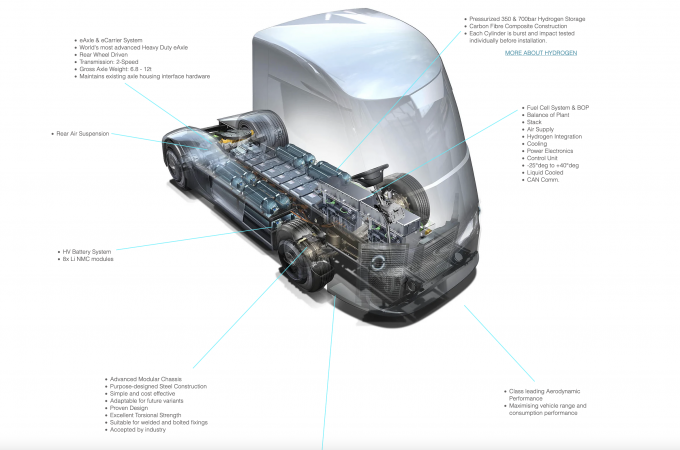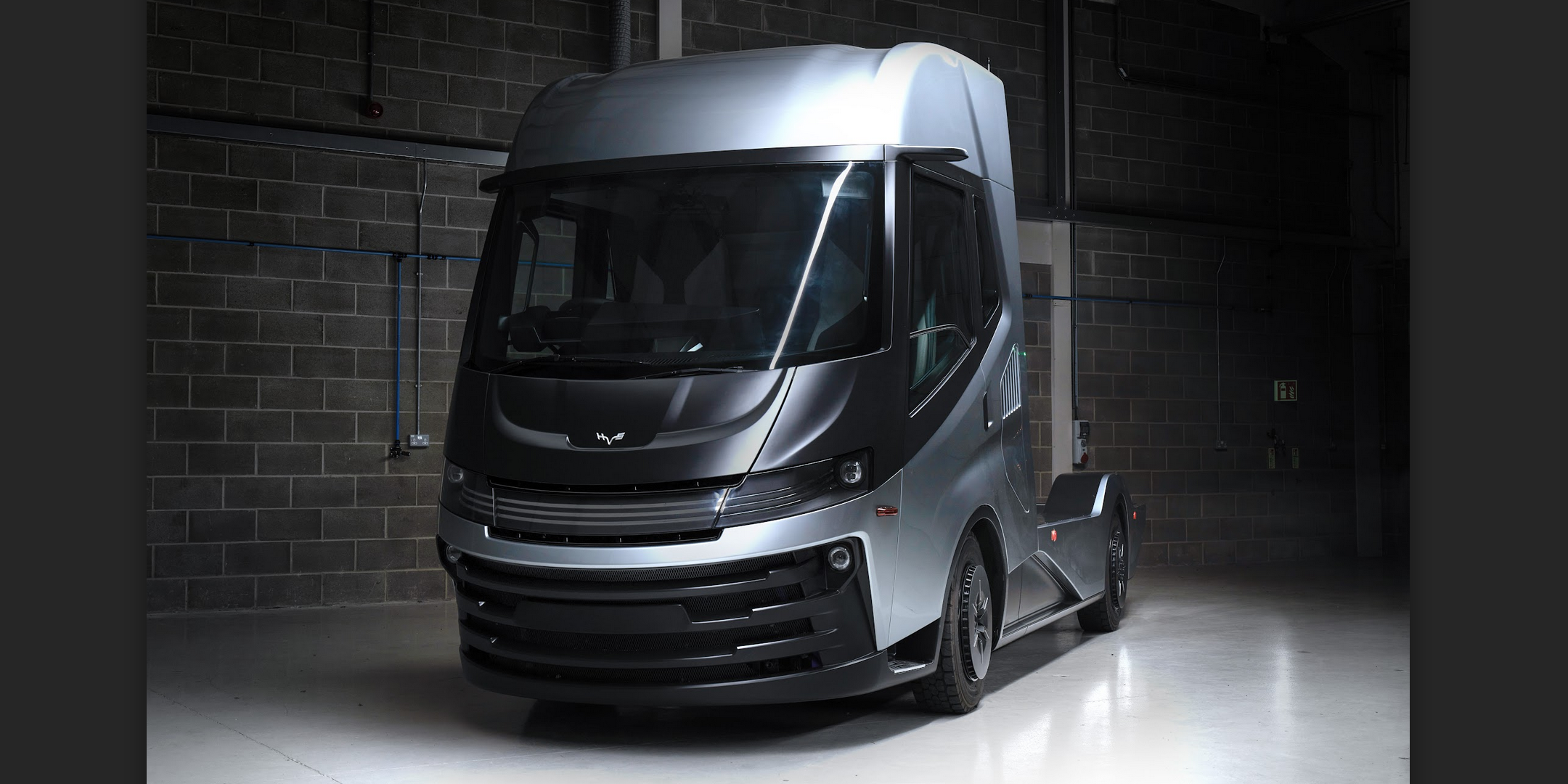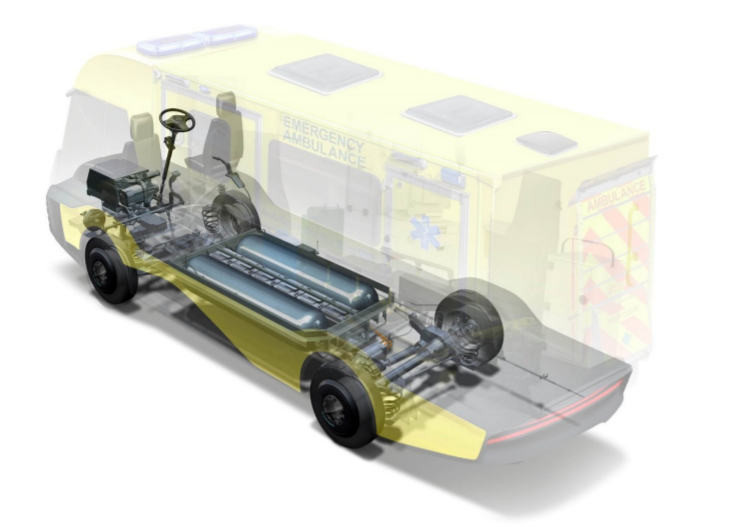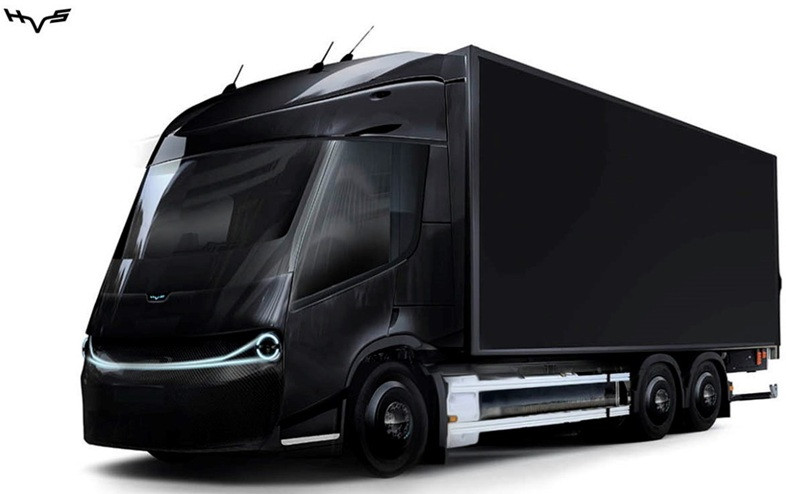Exciting times ahead for UK HFC-truck start-up Hydrogen Vehicle Systems (HVS)
By Luke Willetts - 17th January 2023

HVS cutaway showing key components of heavy-duty tractor unit
UK – Formed in 2017, Glasgow-based start-up manufacturer, Hydrogen Vehicle Systems Ltd (HVS), which is focused on building hydrogen-fuel-cell powered commercial vehicles, has already built two prototype hydrogen-fuel-cell powered vehicles with UK government support (Scottish Enterprise and Innovate UK) - a chassis cab for an ambulance (Prototype 1) and a technical demonstrator vehicle, a rigid-bodied 4.5-7.5-ton GVW medium-duty truck (Prototype 2) - is now focussing on developing a 19t 4x2 tractor unit (40t GVW).
According to Peter Clarke, engineering director at HVS, five HFC-powered tractor units are now being built and these will be tested extensively on test tracks and in the field during 2023/2024. It is anticipated that pre-series production will start at the end of 2024, with production being ramped up in 2025 for UK customers. In the first year, HVS anticipates an output of some 100-250 4x2 tractors, with plans to have scaled production to some 18,500 vehicles by 2031.
Clarke, in conversation with T&BB said the company’s focus was on vehicle design using a clean sheet and modular approach with the design of the vehicle around the powertrain. HVS has a lean engineering team made up of engineers from different sectors of the vehicle world (automotive, off-highway and motorsports) with experts in automotive design, hydrogen, electronics and so on. Clarke added the tractor unit was being designed based on three key vehicle attributes: Cabin design (making use of the additional EU Regulations effective September 1, 2020, that allows the truck cabin to be extended by 900mm to improve aerodynamics and fuel efficiency), chassis materials and design, and powertrain integration. The company says it outsources all the key powertrain components in terms of batteries, fuel cells, hydrogen storage and e-axle from proven/established suppliers, said Clarke.
While demand for 4x2 tractor models in the UK account for just 30% of the tractor market, Clarke explained that this was the most common configuration in Europe and that the vehicle design would enable a left-hand drive version to be built relatively easily for mainland Europe.
HVS has its headquarters in London with its main R&D centre located on the Horiba-Mira ‘Incubator’ site in Nuneaton, near Cambridge. The company plans to set up a pilot production site in the Midlands and says it has already appointed a company, specialising in establishing production lines, called Expert Automation, to set up its first low-volume assembly operation.
Public and private funding
Like all start-ups in the automotive field, there needs to be substantial capital available to initiate projects but also, to fund the growth of the business. The company, early on, was encouraged to develop proof of concept prototype vehicles with financial assistance in the form of project grant funding (as mentioned above) from UK government bodies. These projects have subsequently led to interest from the private sector and over the last year, Britain’s EG Group, has become the major shareholder in HVS, with a series of investments exceeding GBP30 million.
Furthermore, recently HVS announced it is to lead a consortium of UK companies to develop its 40-tonne hydrogen fuel-cell powered heavy goods vehicle (HGV) as part of a project part funded by the UK government’s Advanced Propulsion Centre (APC) under its 2022 zero-emission transport budget. HVS, as part of this project, will receive GBP15 million from APC as half of the project cost, which began on September 1, 2022, and will run until June 30, 2025.
The project brings together a consortium led by HVS and includes other UK-based companies including, Fusion Processing Ltd of Bristol, which will be providing the autonomous driving software, Grayson Thermal Systems of Birmingham, responsible for cooling and HVAC systems, and power electronics provider, PNDC, a commercial arm of Strathclyde University (Glasgow) specialising in power electronics. HVS stated that the money will be used for the development of the vehicle’s fuel cell and battery hybrid powertrain, covering engineering, development and testing at HVS’s R&D centre at the Horiba Mira proving ground at Nuneaton, UK.
Private investment from the EG Group
A GBP25 million investment from British fuel station operator and food retailer, EG Group, to produce a hydrogen fuel cell tractor unit for long haul operations was announced earlier this year. HVS has received funding from the EG Group as part of the EG Group’s holistic approach to decarbonise its fleet of vehicles: The EG Group owns one of the largest retailers in the UK, ASDA; food and drink franchise operations such as KFC and Costa Coffee, as well as more than 7,000 refuelling stations across the UK. According to HVS, the EG Group is looking to provide hydrogen refuelling infrastructure nationwide making HVS a strategic partner in bringing hydrogen as a transport fuel to market.
Ilyas Munshi, EG Group Commercial Director said: “We are committed to driving sustainability across our extensive UK and global fuel forecourt network by investing in HVS trucks, influencing the demand for hydrogen and vehicles in parallel from our large selection of partnerships.”
HVS hydrogen demonstrator vehicle
Late 2022 saw HVS fulfil its promise by displaying a demonstrator hydrogen vehicle, the basis for its planned 40-tonne zero-emission HGV (Heavy Goods Vehicle). This vehicle suitably fits in with recent EC legislation that all sales of new HGVs by 2040 will have to be zero-emission and that consequently, there will be an increasing market demand for bespoke HFC trucks.

HVS’s hydrogen truck demonstrator
Clarke reiterated that HVS tractor units will be built on an in-house designed chassis around the hydrogen powertrain consisting of pressurised hydrogen cylinders, fuel cells, an energy storage system and an eAxle. The design is focused on enhanced fuel efficiency on long-haul runs and improved spatial ergonomics within the cab, designed to help operators meet future operational commitments and target driver comfort and driver retention, respectively.
The fuel cell system and energy storage system deploy electricity to an electric motor to transmit power to the wheels whilst using a kinetic energy recovery system to recapture energy during braking. HVS has designed an advanced control system ‘SEMAS,’ which is responsible for managing fuel efficiency contributing to a low cost of ownership for the operator, whilst refuelling is comparable to traditional diesel HGVs, providing a range of up to 500 km.
Currently, development work is being undertaken at Horiba MIRA with the aim to open an R&D, engineering and pilot production facility in the Midlands in the next two years, with plans in place for the development of a left-hand drive variant of the hydrogen-fuelled 4x2 HGV tractor unit.
Jawad Khursheed CEO of HVS, said:
This technology demonstrator showcases our ground-breaking hydrogen-electric commercial vehicle design and advanced powertrain technology, a precursor to our HGV model. Fuelled by close-coupled green hydrogen (hydrogen produced directly by renewable energy sources such as hydro, wind or solar) our zero-emission trucks are a key part of decarbonising the logistics sector. Hydrogen is the perfect fuel for the haulage industry, offering long ranges and quick refuelling thanks to stations easily integrated into key transport networks. What’s more, we will supply our customers with the most advanced HGV in the sector delivering a step change in driving experience, lowest total cost of ownership and market-leading fleet management support.
HVS wins grant from Innovate UK to build a zero-emission ambulance
2021 saw HVS receive an Innovate UK government grant of GBP460,000 from the Department for Transport to develop a hydrogen-electric ambulance for NHS Greater Glasgow Council (GGC) emergency services, aligning with the NHS GGC’s target of a net-zero fleet by 2025. The ambulance was built and delivered to GGC in early 2022. It can be refuelled in just five minutes – the design incorporated an electric power off-take to allow medical equipment to be operated emission-free without the engine idling or having to be run on a separate generator.
Jawad Khursheed, CEO of HVS commenting at the time of the award said:
This incredible win for HVS to develop a zero-emission emergency ambulance will help healthcare vehicles that need significant onboard power supplies for both transport and for static. The advantages of a hydrogen-electric powertrain that produces its own electricity onboard directly improves vehicle efficiency and reduces CO2 emissions. We also expect the Total Cost of Ownership (TCO) of hydrogen-electric vehicles to reach parity with petrol/diesel vehicles by 2030 if not sooner.

HVS’s hydrogen fuel cell ambulance prototype
HVS receives funding from Scottish Enterprise to develop a hydrogen truck
Early 2021 saw HVS receive a GBP50,000 grant from Scottish Enterprise and Transport Scotland to develop a rigid hydrogen truck. The grant was part of ‘The Can Do Zero Emissions Heavy-Duty Vehicles (HDV)’ challenge to help businesses decarbonise transport.
Jawad Khursheed, CEO of HVS, said: “This HVS study aims to facilitate the decarbonising of the road haulage sector with the introduction of hydrogen fuel cell trucks to uphold the environmental benefits observed from the COVID-19 lockdown and continue the country's drive towards net-zero. This HVS rigid hydrogen-powered truck will have performance parity with diesel regarding heavy payload, long-range and rapid refuelling.”

HVS Rigid hydrogen fuel cell powered truck

.jpg?w=400&h=225&fit=crop)

